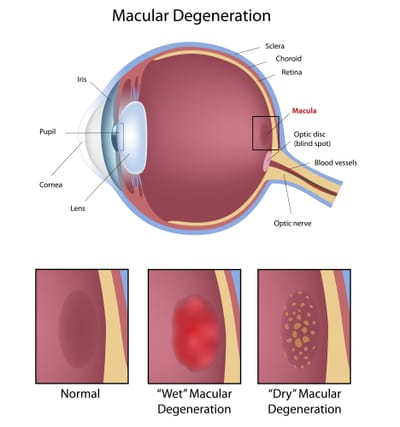Medical Retina

The retina is the membrane that lines the inside of the eye. Think of it like film in a camera. Images are captured on the Retina, encoded, and then sent to the brain via the optic nerve. Attached to certain areas of the retina is the vitreous, a gel-like substance that fills the inside of the eye, giving it shape and volume.
As you can imagine, both the retina and vitreous are vital parts of your vision and can be affected in any number of ways, and can be detected in an eye exam
What Are Common Retinal Conditions?
- Macular degeneration- Macular degeneration is a progressive eye condition affecting as many as 10 million Americans and millions more around the world. This disease attacks the macula of the eye, where our sharpest central vision occurs. Although it rarely results in complete blindness, it robs the individual of all but the outermost, peripheral vision, leaving only dim images or black holes at the center of vision.
Symptoms include: Blurred central vision or blind spots. - Diabetic retinopathy- Diabetic retinopathy occurs when the blood vessels in the back of the eye become weakened and damaged, causing swelling or leakage of blood in the eye. There are two types: nonproliferative and proliferative.
Non-proliferative Diabetic Retinopathy is caused by fluid from the blood vessels in the Retina leaking into the macula, causing it to swell. This can lead to blurry or cloudy vision. In its more advanced stages, Proliferative Diabetic Retinopathy (PDR) sets in and new blood vessels can form in the Retina. These irregular blood vessels can cause damage by leaking blood into the vitreous. If untreated, PDR can possibly lead to Retinal detachment and even glaucoma. - Floaters- Floaters are small abnormalities in a person’s vision. They can appear as tiny spots or small curvy lines that move along with the movement of the eye. There are many possible causes of floaters, but usually, they are the result of foreign matter in the vitreous, physical injury to the eye, or another existing eye disease.
While floaters do not have major adverse effects on the overall vision, it is important that people experiencing these spots monitor them closely as they could be indicative of a more serious condition.



